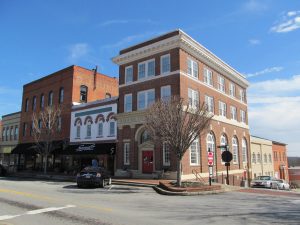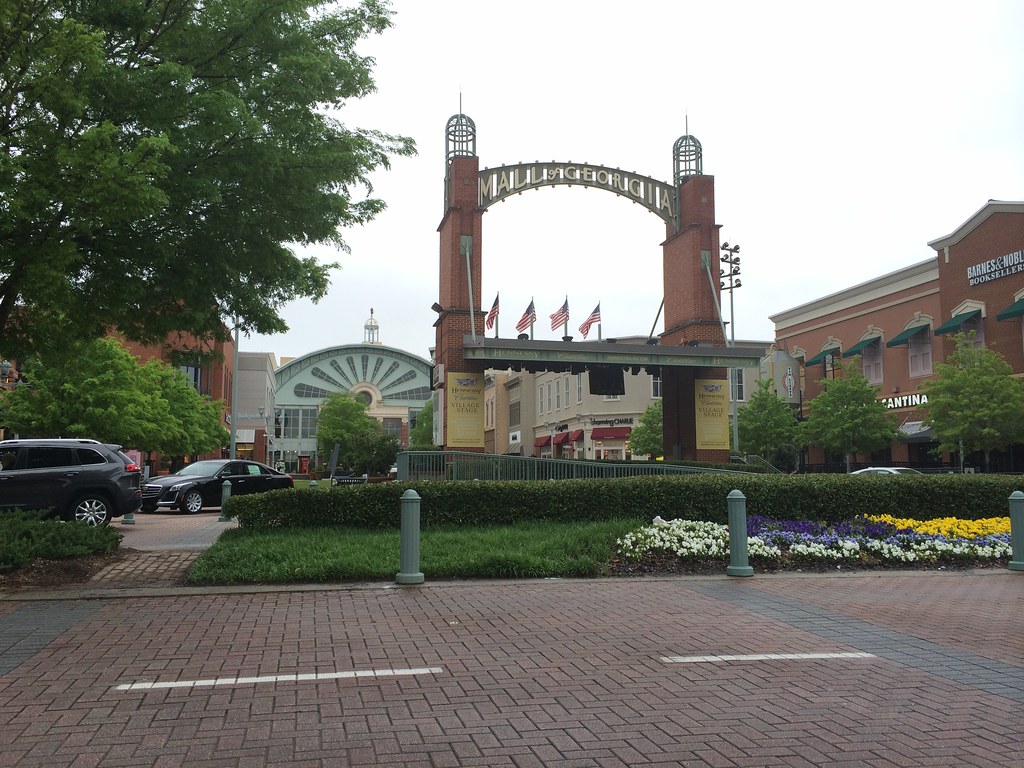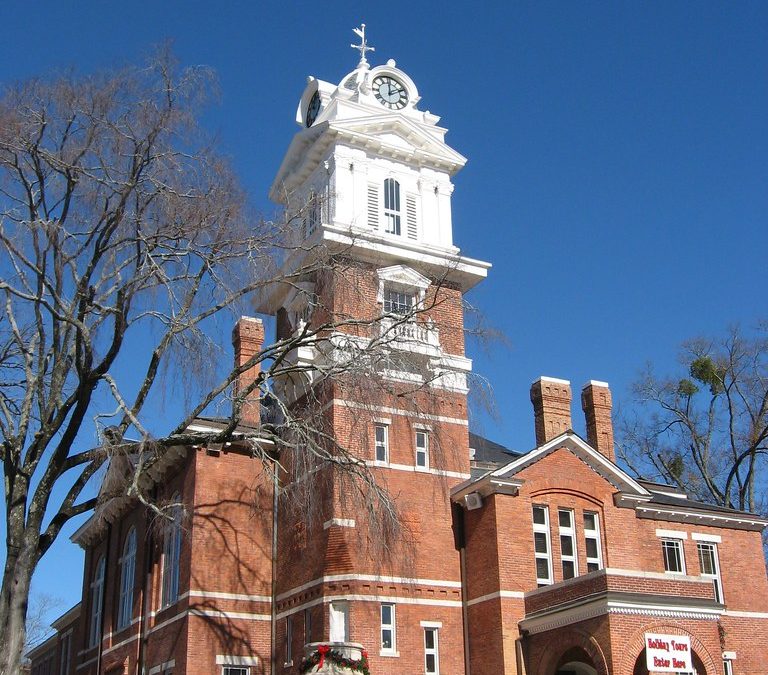Founded in 1871 by Thomas S. Garner and Larkin Smith, the town of Buford is deeply rooted in Georgia’s history with large landholders and prominent families driving its culture and economy. Drawing its name from A.S. Buford who was president of the railroad, locals built the city up with hotels, stores, and churches as the cornerstone.
In the 1860s, Buford was home to several prominent families and landowners, such as Silas King and his family who occupied what is now downtown Buford, William Sudderth to the south and east of King, and Wyatt Wilson with over 1,000 acres north of Buford. Other notable families included the Scales, Bagby, Benson, Dodd, Moulder, Calloway, Garner, Cloud, and Brogdon families, all of whom were large landholders and, for the most part, slave owners. These early settlers laid the foundation for what is now present-day Buford, a vibrant and thriving community.
Mr. Thomas S. Garner and Mr. Larkin Smith were proud to bring life to a new town which they named after A. S. Buford, President of the railroad. They divided their property into lots and the first two buildings that were built were a hotel run by the mother of Thomas S. Garner, who had come from Alabama for the job, and a store across the railroad owned and operated by Mr. Mellville S. Garner. Thomas S. Garner later bought out the interest of Mr. Smith and generously provided land for white and African-American churches, schools, streets, and a city park. In this way, the town of Buford was established in 1871.
The city of Buford was incorporated on August 24, 1872, with Adam Pool as one of the first Commissioners.
Adam Pool was born in South Carolina in 1809 and relocated to DeKalb County, Georgia around 1830 and then to Gwinnett County the following year. He was an esteemed Tax Collector, Confederate State legislator, postmaster, and one of the first merchants in Buford.

Austin Gilliam Harris and John Ferdinand Espy are two of Buford’s most respected pioneers, both leaving a lasting impression on the town and its people. Austin Gilliam Harris was a successful farmer and cotton gin operator who lived in the Sugar Hill area as early as 1860, he was also a delegate to the Democratic Congressional District Convention, operated a retail store, and served as Buford’s postmaster. Meanwhile, John Ferdinand Espy was a teacher from Lawrenceville who moved to Buford and is believed to have been related to the Silas King family, his mother’s maiden name being King. He served in the Confederate army and was known as “Captain Espy” for the rest of his life. He also built the first brick home in Buford which still stands today at 583 South Hill Street.
The remarkable William R. Chamblee was an early Buford merchant, opening a store in 1873 and going on to serve as school trustee and Gwinnett County Tax Receiver before he died in 1884. James R. Stringer, born in Hall County, Georgia in 1845, spent several years in Buford before moving to Rockmart, Georgia. Meanwhile, James Alexander Pattillo opened a successful dry goods, groceries, and produce store in partnership with J. N. Thompson. Several physicians served the Buford area too, including Doctors Robert Marbut, Nelson C. Osborn, W. W. Power, W. J. Rowe, Rl. L. Neal and Dr. Bryan.
In 1874, the Town of Buford was officially recognized as the City of Buford, providing for a Mayor and council. This recognition was made possible by the intrepid efforts of W. E. Haygood and J. E. Cloud who served in the office of Mayor. Robert H. Allen, a resident of the area since 1867, opened the first leather industry in Buford, with a harness factory and leather tannery. He was a prominent Buford businessman for over thirty years. William R. Chamblee was an early Buford merchant, opening a store in 1873 and going on to serve as school trustee and Gwinnett County Tax Receiver before he died in 1884. James R. Stringer, born in Hall County, Georgia in 1845, spent several years in Buford before moving to Rockmart, Georgia. James Alexander Pattillo opened a successful dry goods, groceries, and produce store in partnership with J. N. Thompson. In addition, several esteemed physicians served the Buford area, including Doctors Robert Marbut, Nelson C. Osborn, W. W. Power, W. J. Rowe, and Rl. L. Neal and Dr. Bryan. This collection of pioneers proudly helped to shape the City of Buford into what it is today.
Robert H. Allen’s younger brother, Bonaparte Allen (later shortened to Bona) moved to Buford in 1872 from Rome, Georgia, and the leather industry was expanded. In the early days it appears that the brothers were partners, but by the late 1870’s they seem to have discontinued their partnership. These two brothers were instrumental in establishing the leather industry in Buford and laying a strong foundation for its continued success.
The Buford Methodist Episcopal Church, South was the first organized church in Buford, with Dr. “Buck” Williams and Rev. Joshua Bradford as its first pastor. T. S. Garner donated the land for the first frame building. Following this, the Buford Baptist Church was established on June 14, 1873, with D. J. Maddox, W. J. Pirkle, and A. G. Cooper acting as a presbytery. The charter members included Sara Barnett, D. J. Barnett, M. A. Kennedy, Mary Cheek, Nancy Cain, Mrs. L. V. Hendrix, W. T. Hendrix, Mrs. Mary Chamblee, W. E. Chamblee, Mrs. V. A. Terry, Stephen Terry, Mrs. W. E. Haygood, and W. B. Haygood. Buildings were erected in 1873 and 1909 to house these churches, providing a meeting place for the local community.
In the early 1900’s Buford proudly earned the reputation of being the “New York of Gwinnett” as many factories and merchants were located in the area. Despite experiencing several destructive fires, most of which were caused by wooden structures, Buford persevered and replaced these buildings with brick structures, further solidifying its place as a prosperous town.
By the late 19th century, Buford had become an important cultural and economic hub in Georgia’s Gwinnett County thanks to the vision and hard work of a few prominent families who chose this location during the period preceding the Civil War. Their commitment to providing homeownership opportunities, encouraging growth, and inspiring future generations built the foundation of a vibrant community that continues to thrive today, all thanks to individuals like Silas King, William Sudderth, Wyatt Wilson, Thomas S. Garner, and Larkin Smith.






